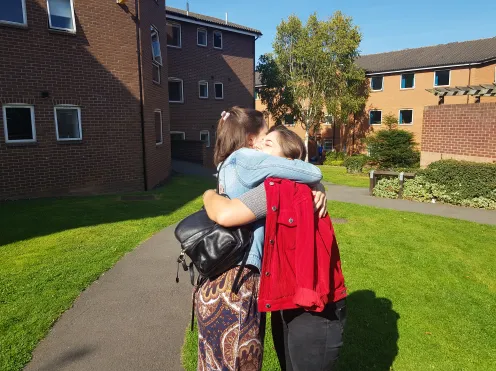By Evee Mill-Gammin
When I came to university, I was armed with all the conversations Mum and I had together. I was ready to shoehorn everything and everyone into the university mould I had created in my mind over my gap year.
This was it. This was me finally living my life after death.
It is so strange to look back on the person I was before university. I am so proud of my university experience; of all the turns that have led me to where I am today. But first, I want to tell you about some of the challenges I faced along the way. This post looks at the struggles that I found and the impacts of these issues, in order to give you a representation of what grief at uni can be like.
You can see Evee’s original post on The Grief Reality here.
Feeling like an outsider
One of the most immediate feelings I grappled with, was feeling like an outsider. I have been assured by numerous people over time that everyone feels like they don’t fit in, but this was crippling and exaggerated by grief. Everyone seemed to know what they were doing, where they were going, and who they were going with. Everyone had a style, an aesthetic, a gym plan, and recipes they liked.
I sat in tutor groups, being berated for not knowing sources, and for not being prepped by my school enough. I think those are normal university student experiences to have, but then I was experiencing grief and triggers on top.
My feelings of being an outsider came from waking up from night terrors, having days where my head was too heavy to lift off a desk while my flatmate awkwardly asked if I was okay. It came from hosting grief groups and that being my passion, whilst others were preparing to go out to clubs. My feeling of being an outsider was not something cured with time, it seemed to get worse, and it was something other people picked up on.
Homesickness
When I was a little girl, I never got homesick. I was too excited to be with my friends to miss my mum, and often didn’t even want to go home with her. I remember writing on this blog “home is a feeling I will carry with me wherever I go.”
But a feeling is not enough. A feeling isn’t a sanctuary you can go to when there’s a pandemic for example, and you have to evaluate the best place for you to live for the foreseeable future.
It kills me to ever refer to myself as ‘naive’ after experiencing loss, but I think I was naive in this scenario. I thought not having a true home would be easy to eradicate because I would have my flat or my house. Yet this was the thing I hated more than anything. I think many issues from my uni life came from not having somewhere else to go, to leave and not come back for a few days. Instead, I was constantly locked into university life, never wanting to admit that I wanted to leave because that would be to admit there was a problem that I had no way of fixing.
I think the result of this was overwhelm and hyper-independence.
Hyper-independence
Something I remember vividly after mum passed away, was sitting on my bed and imagining myself as a metal ball. I was in my hands and I was smoothing myself over, again and again, telling myself to “toughen up.”
I think what “toughening up” meant for me was to stop feeling weak and vulnerable and to begin to feel strong, capable and self-assured.
I think independence is healthy, and it is a positive, natural evolution of becoming an adult. But my hyper-independence came from not feeling like I could ask for help. Asking for help was often met with “don’t worry”, “you worry too much”, or “That must be tough for you”.
When I feel vulnerable, I feel sick and nauseous. It is a very physical response, and it is exaggerated by wanting to run to Mum. So I tried to squash moments of feeling vulnerable by giving myself everything I needed. I began to try to be Mum for myself.
I think this is fairly normal for children who have lost parents: to recreate traditions you did together, to buy yourself gifts you think they would buy you, to try to parent yourself into being a good person. I have often heard this phrase as “re-parenting”. I’ll talk about re-parenting a bit more in the next section.
But I took this a bit too far, I think. And again, if you think of what a parent represents (a safe place to teach you boundaries, someone to give advice) I am not surprised I went this way. Slowly, I became a house that grew its own vegetables, had solar panels, had a wind turbine, and was completely self sufficient. I peaked out of the windows, and shut them when people walked past.
I hated vulnerability so much, that I tried to give myself everything I could to the point of burnout. I am hugely self-critical, and I have a mentality that I cannot depend on others. I am glad to recognise it now, for what it is, before it spins away from me and I can’t catch it. Something that has helped me, is the phrase “let people love you”. Slowly, I am learning to let people help me.
With grief comes a multitude of other feelings of loneliness, fear, anxiety, and sadness that comes in waves. These waves are exemplified when students cant access help and mental health services tailored specifically for grief and loss.
Universities are notorious for poor mental health services. Luckily for me, in my second year, I had a transition worker in Devon who advocated for me when I needed it. Thus, one of the overarching moments I had in my uni experience, was counselling. I had a lot of counselling in my second year, and that helped me to develop coping mechanisms and learn to stand up for myself and view things in a new way.
Craving being understood
Finally, in this section, I want to explain how much I wanted to be understood. I think your mum is someone who stands by you through thick and thin and spends as much time as you need to hear and help you. Without this, I think I just accepted – and it scares me how easy it happened – that outside of Katie, no one would understand me. No one knew mum, no one knew how close we were. So of course, there will always be a roof to my relationships, there will always be a part of me people can’t quite reach.
But of course, I wanted that. Of all the things I could give myself, the external understanding was something that I couldn’t reach. Counselling helped, but it also helped when I started to meet people who made me jump when I closed the door on myself. In my safe space, I would turn to find them turning on my salt lamp, and settling down to distract me, talk with me or just love on me.

You can see more of Evee’s writing on their website:
The Grief Reality – Normalising the conversation about Grief.


